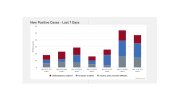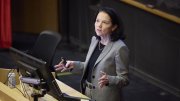Harvard reported Tuesday, December 14, that the COVID-19 case count on campus in the prior week—178 positive tests—was more than triple the average weekly case count throughout the fall semester: this in a community of students and employees with a 97 percent vaccination rate.
In a letter addressed to members of the Harvard community, Provost Alan Garber, Executive Vice President Katie Lapp, and Harvard University Health Services Director Giang T. Nguyen, called the increase “concerning.” Contact tracing, they wrote, revealed “no evidence of transmission within classroom settings,” where students are required to wear masks. The high case numbers “can be attributed to” post-Thanksgiving “unmasked social events and gatherings.”
Students are scheduled to finish academic work this week, taking their last exams and turning in papers before departing campus in a few days. The letter urged community members to “take every step possible to protect ourselves and those around us,” by minimizing contacts, wearing masks indoors, maintaining distance, getting tested regularly, getting vaccine booster shots, and considering cancelling “any upcoming indoor celebrations that involve unmasking.”
The letter noted that Harvard’s contact tracers have been slowed by the increase in the volume of cases, and that the University’s health services are responding to increased clinical demand that could prolong wait times.
Harvard, where the recent increases have been driven for the most part by the Delta variant, and where the test positivity rate of 0.5 percent remains excellent, is still faring far better than some other campuses. Cornell, which reported yesterday more than 900 COVID-19 cases amidst a surge of infections, including some with the new, highly transmissible Omicron variant, moved exams online, canceled a ceremony for December graduates, and shuttered libraries and gyms. Middlebury College took similar action on December 9, when it moved classes and exams online and postponed in-person events, including athletics competitions and performances. At least two other universities have signaled plans to move to all-remote instruction when classes resume in January.
According to a report in The Chronicle of Higher Education, the Omicron variant has also been detected at George Washington and Georgetown Universities.
Although many questions remain about the severity of illness caused by the Omicron variant, its transmissibility is extremely rapid, with case counts doubling simultaneously in countries around the world every 2-5 days. And it can clearly lead to hospitalization and death in some cases.
In the United States, a panel of experts convened by the Massachusetts Consortium on Pathogen Readiness reported yesterday that many hospital systems are already overwhelmed; a combination of illnesses and procedures that patients have postponed attending to during the pandemic, together with a surge of COVID-19 cases caused by the Delta variant, have led hospitals to begin considering whether they should scale back on elective surgeries.
The United Kingdom, said Bronwyn MacInnis, director of pathogen genomic surveillance at the Broad Institute of MIT and Harvard, and a visiting professor at the Harvard T. H. Chan School of Public Health, “where the demographics and vaccination levels are similar” to those in the United States, may foreshadow what can be expected, and the data on the speed of spread, “are quite alarming at this point.” In London, she said, Omicron is already the most common variant, at more than 50 percent of the COVID-19 cases. Estimates of the prevalence of the new variant in the United States, as in populations around the world, are based on lagging indicators, and may understate the reality. Although the U.S., after initially trailing, now leads the world in genomic sequencing of the virus (in absolute numbers of samples sequenced), “There isn’t a surveillance system on the planet, truly, that could keep up with…this kind of doubling time.” Her concern is that even if the Omicron variant is less severe, it could nevertheless overwhelm hospitals due to the sheer number of cases it has the potential to cause. And the more cases there are globally, the higher the threat of “continued evolution and emergence of new variants.”









